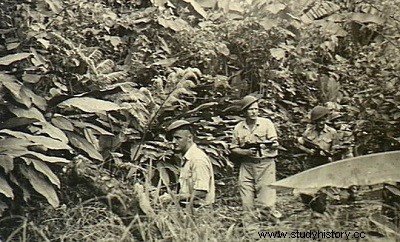
It is in a similar jungle that we will live in Indochina, that we will fight, we will rest, we will carry out our action and where we will take refuge after the sabotages. We must therefore know it, know how to use it, know how to benefit from it for our food and our health. “The jungle is neutral,” Chapman says. It favors only those who love it and know it.
We quickly discover the advantages that this environment offers us for our clandestine activity:a fire cannot be seen fifty meters away, a detonation is muffled there at short distance; one can remain hidden, without being detected, to touch an enemy column. We learn to live without a trace, to soap ourselves without the water detecting our campsite downstream.
We learn to prepare hidden retreat tracks, to camouflage equipment, to install a underground radio station. We are called to live for months in the humid forest, we must live as comfortably and hygienically as possible, so we make tables, beds, even armchairs, pantry, all in bamboo.
Everyone has their own small pharmacy kit with everything they need for these urgent cases:acriflavine against burns, M.B. tablets against infections, mosquito repellent, morphine, opium and chalk pills against diarrhoea, powder against Hongkong feet, these microscopic fungi which develop in colonies between the toes, ointment against scabs, atebrin and plasmoquine against malaria...
We know how to act against leeches, so numerous in the humid forest, "buffalo" leeches of swamps and muddy pools, as big as a finger, or tiny bamboo leeches. The latter, which are found between 300 and 600 meters above sea level in particular, are barely thicker than a match.
They come from everywhere, from the ground, from the trees, from the vines, they float on the leaves or the wood debris of the rice fields and attack the unfortunate passer-by by the dozens.
They infiltrate through the eyelets of the shoes, through the buttonholes of the garment, they penetrate into all the natural orifices, into the nostrils, the ears. Engorged with blood, they reach the size of the little finger. The old Burmese ranger tells us how to protect yourself against it:anoint your body with soap or the juice of teak leaves; but the monsoon quickly washes everything away, so we prefer the old traditional method of Southeast Asia, the nicotine-smeared stick or the lit cigarette which makes the critter let go... when you see it.
We have trouble with certain caterpillars that weave a web so thick that you are caught in it like a real padded and rubbery net. We kill large spiders with guns. We protect our feet at night, because some butterflies lay their eggs under the skin of the toes and you find yourself in the morning in the middle of a cloud of small fat butterflies, while your feet quiver as if under the prick of dozens of sharp needles. ..
Against mosquitoes, we apply the old rules:long clothes at sunset, preventive atebrine (which gives us a yellow complexion of the most beautiful effect), head mosquito net which is tied under the neck. Against termites and ants, we build defenses... and use them to cook delicious food.
We consume a lot of ammunition to get accustomed to combat. In the forest, skirmishes sometimes last only a few moments. At the bend of a path, we can come across an enemy patrol that no noise has detected. Victory... or life is then to whoever shoots the fastest and best. Always two shots, one to force the opponent to lower his rifle, the other to kill him. Along the paths, in the trees, at the level of the bushes, there are silhouettes that suddenly stand up when we follow the route.
